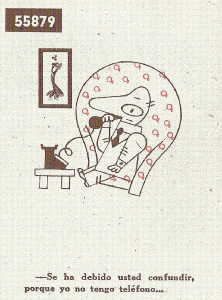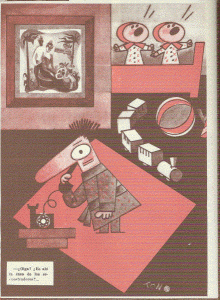Greguerías Posted by Magda on Mar 26, 2010 in Spanish Culture
Today we are going to talk about a literary device that is part of Spanish culture: a mixture between “juego de palabras” (pun) and metáfora (metaphor), known as Greguería.
The name was coined by the Spanish author Ramón Gómez de la Serna, one of the first writers to use this device. He was born in 1888 and, even though he studied Derecho (Law), he dedicated his whole life to literary and artistic pursuits. De la Serna was not only “el padre” (the creator of) Greguerías, but also a prolific author of biographies, novels, plays, essays, literary magazines and newspapers… He was one of the most important figures in the Spanish Vanguardia (avant- garde), took part in tertulias (informal public debates to share ideas and discuss about politics, art, society, etc.) and was a great influence in the Surrealismo (Surrealism), where the element of surprise was one of the main features.
Greguerías are poetical sentences, with some hints of humor and metaphor. The author obtains a funny effect through:
- Visual association of two different images: La hache es la escalera del abecedario. (The letter H is the ladder of the alphabet)
- Free association of related concepts: Aquel tipo tenía un tic, pero le faltaba un tac; por eso no era un reloj. (That guy had a tic, but he was missing a tock; that´s why he wasn´t a clock.)
- Free association of opposite ideas: No importa que nuestro vaso sea pequeño, pues lo importante es que la botella esté llena. (It doesn´t matter if our glass is small, because the most important thing is that the bottle is full.)
- The reversal in the logic relation between two concepts: Lo más importante de la vida es no haber muerto. (The most important thing in life is not to be dead.)
But Ramón Gómez de la Serna is not the only Spanish author who became famous for his humorous and satiric works in the beginning of the 20th century; we can find another example in the jienense (from Jaén) Antonio de Lara Gavilán “Tono”, who used both language and images to create early examples of graphic humor:
“You must be mistaken sir, because I don’t have a phone…”
“Excuse me, is this the kidnapper’s home?”
I tried to write my own one. What do you think?:
“La luna es el queso del cielo, que a veces es mordido por el ratón del sol…”
Now let’s have some fun… Can you rearrange these sentences to create greguerías?
- dando la mano – a su pie – se saluda – a sí mismo – El bebé
- Las camisetas – los recuerdos – como – encogen
- de los mayores – El cigarro – el chupete – es
- hay que ir- por detrás – Al cine – bien peinado – sobre todo
- de denunciar – La gallina – en la comisaría – los huevos – está cansada – que le roban

Build vocabulary, practice pronunciation, and more with Transparent Language Online. Available anytime, anywhere, on any device.






Comments:
Kabir:
Hola Magda,
Thanks for a very interesting and enlightening article on greguerías. I had never heard of this word before but now I know. You explained it very well.
I think I am going to search on the internet for more greguerías because I love puns and metaphors and I really enjoyed the examples that you have given (including the one that you wrote — I loved it!)
Now let’s see if I can correctly create those greguerías:
1. El bebé se saluda a sí mismo dando la mano a su pie.
2. Las camisetas encogen como los recuerdos.
3. El cigarro es el chupete de los mayores.
4. Al cine hay que ir bien peinado sobre todo por detrás.
5. La gallina está cansada de denunciar en la comisaría que le roban los huevos. (I’m sorry I don’t understand this one).
davidcarmona:
@Kabir Good job, Kabir! You got all of them right.
Magda:
I´m so pleased you liked it Kabir!
And once you know them, you always keep them in mind! It´s a great way of combining both fun and poetry.
The last greguería explains the situation of hens reporting that their eggs are constantly stolen! But the police doesnt´seem to care about it…
Judin:
I thoroughly enjoyed it. Short, simple and sweet to the intellect.
Magda:
@Judin Thanks Judin!